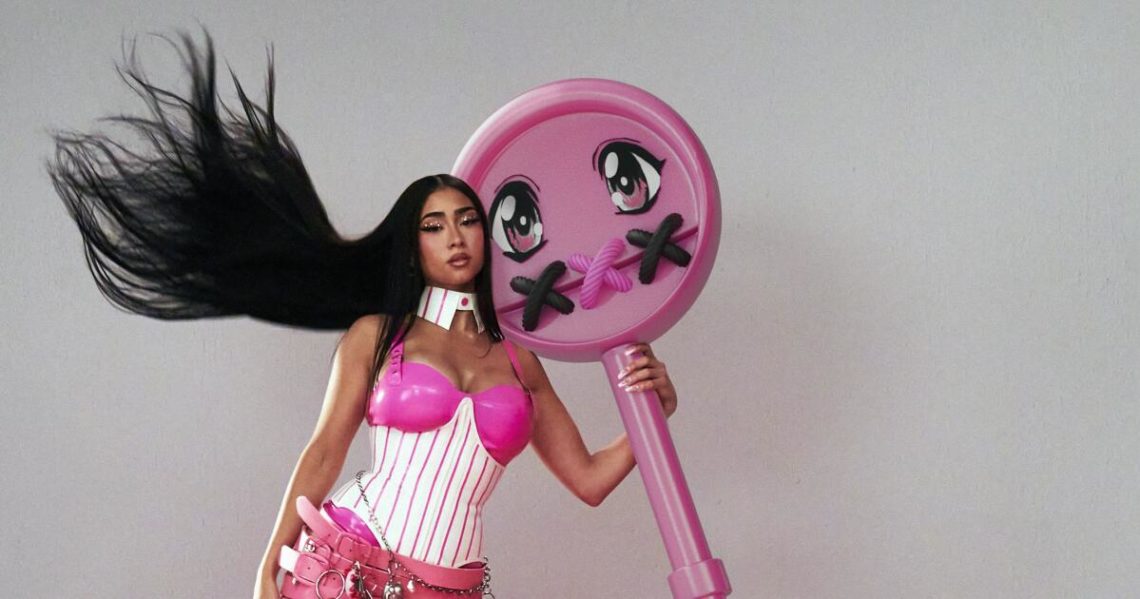Something shifted within Paloma Mami when she turned 25, she said — referring to the age at which the average human’s frontal lobe, the part of the brain that manages one’s decision-making process, becomes fully developed.
“One day I woke up and decided to change my life [by] 360 degrees,” she told The Times in a recent audio call from Chile, where she is currently located. “No joke, I thought [frontal lobe development] was a myth, but I started seeing things so differently and I didn’t understand why. I’m just transforming.”
That transformation is most audible in Paloma Mami’s latest studio album release, “Códigos de Muñeka,” an 11-track project that catapults the urban singer into a new era of womanhood — one that radiates wisdom, confidence and bodily autonomy in spite of a growing conservative “trad wife” movement that’s sweeping the internet.
But don’t be fooled by her coquettish, pink aesthetics. This LP is a fierce celebration of sexual independence, most prominently in kinky reggaeton tracks like “La Freak” (ft. Puerto Rican heartthrob Rauw Alejandro) and the teasing “Mi Kama.” To call the record flirty might even be an understatement, as Paloma Mami openly details a steamy rendezvous in the R&B pop track “Imagina,” and goes beyond foreplay in the salacious trap song “Dosis.”
Paloma Mami remains in control throughout the album, airing out the flaws of egotistical past lovers in her song “Igo” and dreaming of what could have been in “Sinkronizamos,” which she sings alongside indie crooner DannyLux — who apparently developed a soft spot for his collaborator in the process. All in all, the LP is a thesis of a grown woman who is no longer afraid to advocate for her emotional and sexual needs.
“This album took three years in total,” she said. “I was going through things mentally and personally. I was not really in the headspace to be able to finish it the way that it needed to be done.”
Born Paloma Rocío Castillo Astorga in New York City, she spent the majority of her youth in Manhattan — before her mother relocated the family to Santiago, Chile, in 2016 due to the singer’s habitual class cutting. In 2018, she self-released her first single, “Not Steady,” which became a viral sensation — and earned her a deal with Sony Music Latin.
Soon after, Paloma Mami briefly competed in a national singing competition called “Rojo, el color del talento,” appearing in only two episodes, and opened for reggaetón icon Arcángel during his 2018 concert in Santiago.
“ I’d never stepped in a studio before [recording ‘Not Steady’],” she said, noting that the Spanglish track originated with a verse she recorded off the cuff. “The rest is history.”
Although the fast-paced nature of the music industry would push many singers her age to release a half-finished product, that would never be the case for Paloma Mami. She took ample time to shape her 2021 debut album for Sony, “Sueños de Dalí” — a dreamy blend of of R&B and dembow rhythms that set her apart from the pack.
And just before releasing “Códigos de Muñeka” in July, she became the first woman and non-Mexican artist signed to Peso Pluma’s Double P Management. It was a move that’s already indelibly changed the trajectory of her career — and in our interview, she details her frenzied path to success.
This interview has been edited and shortened for clarity.
What head space were you at when you were creating “Códigos de Muñeka?”
Half of it was done here [in Chile] and half of it was done [in the U.S.]. For a large part of the creative process, I put everything to the side for a bit and was reconstructing everything because I was going through things mentally and personally. I wasn’t really in the headspace to finish this the way that I wanted to, and the way that I feel like it needed to be done. It was a transformative time in my life.
You say it was “transformative,” but what do you mean by that?
I was 23 years old when I was doing this album; now, I’m 25. As a woman, we go through so many emotions daily and monthly.
I know you might not want to put a label on it, but how would you define your style of music?
When I have categorized myself in the past, I’ve swallowed my own tongue. Then when I try different things, people are like: “Why are you trying something else, when you said you do this?” The category I feel is just free.
You moved from Manhattan to Chile around age 16. When you were making that transition, what was going through your head?
When my mom told me we were moving, at first I was hurt; but I thought, “I’m just gonna restart my whole life.” I would always try to find the good in situations. I didn’t say bye to anybody. Nobody knew, including my best friends. I just dipped, like, “Y’all can see me on [Instagram].”
That mindset was what made me get into music. I thought: “I’m gonna do everything that I wouldn’t have dared to do when I was in New York. I’m going to act in a whole new way. I’m going to be a whole new Paloma.” Within the first year, I met people in the industry and got into the studio.
Is that when you got into the studio to record “Not Steady,” your first viral song?
I [was] offered [studio time] by this producer that I had met through a music friend. He was like, “Do you sing by any chance?” And my sister, she’s my wing-woman, she was like “Yeah, she sings!” [But] I would be like, “No, I don’t.” I was kind of shy.
Eventually I wrote to him a couple weeks later, like: “Hey, I’m trying to see what a studio is like.” That’s how “Not Steady” came about — just on some chill vibes, not expecting anything.
In thinking about who you were when you recorded “Not Steady” versus who you are now, what has changed?
I’m still the same little girl in a way — I try to keep her alive. I always go back to that day [in the studio] and think about how I went in there without any expectations. I create my best work when I’m just not expecting what people want to hear.
How did it feel to become the first Chilean signed to Sony Music Latin — then the first woman on the Double P Management roster?
It really is an honor for me to be the trailblazer for Chile. Especially for female singers. I always dreamt of being able to open doors and inspire. Being one of the firsts [from] Chile, that still blows my mind. It’s so crazy how the genre is for [women]; it’s growing so much, but it’s still very slow.
What specific “Códigos de Muñeka” tracks resonate deeply with you in life?
In the gym, I’ll be putting on my song “Hakia” because it empowers me. It gives me that confidence in myself. “Imagina” as well; [it has] a sultry, vulnerable vibe. I love the whole trap-soul movement. Also with “Igo,” it’s [inspired by] dancehall, Afro[beats], Amapiano — that’s definitely the music that I’m listening to right now.
You didn’t have any features in your first album, “Sueños de Dalí.” But this time, you paired up with artists like Rauw Alejandro and DannyLux. What was it like to collaborate with them?
I hadn’t done too many collaborations before this, [but] I learned so much from every person that was in the album — from the Chilean artist Marcianeke, Ithan NY, to Pablo Chill-E, to Rauw and Danny. I’m excited to keep collaborating with more people in the future. Just being able to learn from other artists and see their process, I’m a nerd when it comes to that.
What’s next for Paloma Mami?
Listen: We cooking. Because the grind don’t stop here, girl.
I did this [album] a long time ago, [but] the songs feel super fresh every time I hear them. I’m excited to keep working and experimenting.
The post Paloma Mami graduates into womanhood with new LP, ‘Códigos de Muñeka’ appeared first on Los Angeles Times.




